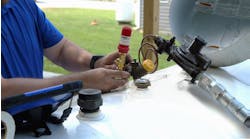The country lost valuable tools to fight terrorism and secure chemical facilities when Congress allowed the Chemical Facility Anti-Terrorism Standards (CFATS) to expire last July, according to a new survey report from the American Chemistry Council (ACC).
Congress directed the Department of Homeland Security (DHS) to create the CFATS program in 2006 to help protect the chemical sector, but after delivering solid results for almost two decades, Congressional leaders failed to pass legislation to reauthorize CFATS, ACC said. ACC conducted a survey of member companies to better understand the concerns and impacts regarding the expiration of CFATS.
“For the first time in nearly two decades our country finds itself without a chemical security program,” Chris Jahn, ACC president and CEO, said in a news release. “The loss of CFATS is a gift to our adversaries and makes it easier for terrorists to attack our country.”
Overwhelming support
A majority of companies responding to the survey expressed support for restoring CFATS and are concerned securing chemical facilities will be more difficult without CFATS. And most companies made it clear that chemical security should be regulated at the federal level and not through a patchwork of state programs.
- Ninety-six percent of companies support restoring CFATS.
- Eighty-five percent of companies are concerned that not restoring CFATS will hinder chemical security.
Delivering value
A large number of companies said they benefited from the security tools that can only be provided through CFATS, ACC reported. They said these tools were especially useful when developing security plans and, in some cases, irreplaceable. Particularly the ability to vet personnel against the Federal Bureau of Investigation’s terrorist database and the insight and expertise provide by audits and inspections conducted under CFATS by DHS.
- Seventy-five percent of companies say the ability to vet personnel against the terrorist screening database (TSDB) was important.
- Fifty-six percent of the respondents do not have an alternative way to adequately vet personnel for potential security threats.
- Ninety-two percent of companies say DHS was helpful to designing/improving security plans.
- Nearly half say they do not have an alternative way to obtain the same level of assistance for developing security plans that they receive from DHS through working together under CFATS.
“CFATS provided a powerful one-two punch in the fight against terrorism,” Jahn explained. “The program was highly effective in helping companies vet personnel for potential ties to terrorism and beef up their security plans. CFATS is a good example of how smart regulations can help the protect the country and provide value to the regulated community.”
Congress must act
In addition to the support of large and small businesses, emergency responders and labor have sent letters urging Congress to restore the program.
“Congress has propped open the door for our adversaries by letting CFATS expire. When it comes to national security companies should not be forced to go it alone,” Jahn concluded. “The House and Senate must do their jobs and restore CFATS.”









